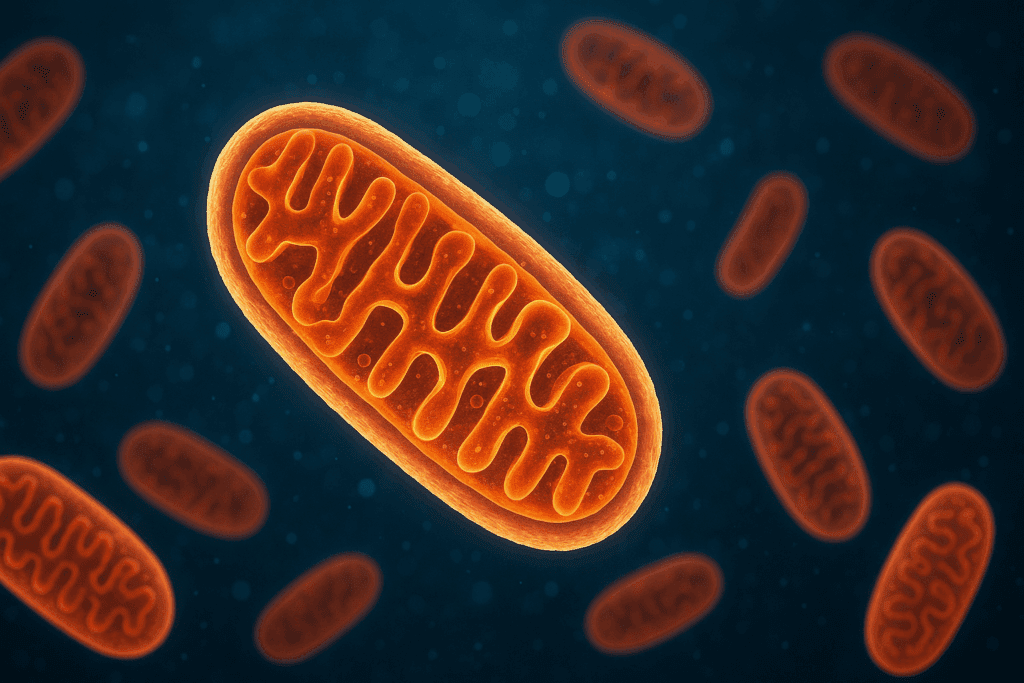
For decades, mitochondria have been described as the "powerhouse" of cells, responsible for ATP production. This definition is correct, but extremely reductive.
Today we know that mitochondria are biological regulatory centers that affect almost every aspect of our health-from immunity to hormones, metabolism to aging, and cognitive function.
The healthier and more efficient our mitochondria are, the better our ability to live, function and regenerate.
Some key functions of mitochondria:
🛡 Mitochondria and Immunity
Mitochondria defend not only the cell, but also the whole organism:
- produce ROS (reactive oxygen species) that act as antimicrobial weapons
- They regulate the innate immune response, via mtDNA release and MAVS (mitochondrial anti-viral signal) signaling
- They regulate macrophage activity (pro-inflammatory or reparative).
👉 Without efficient mitochondria, the immune system loses power and precision.🧬 Hormone production
- Steroidogenesis starts in mitochondria: cholesterol is converted topregnenolone (via CYP11A1)
- From pregnenolone are then derived testosterone, estrogen, cortisol, and all other steroid hormones
- Mitochondria in endocrine cells (testis, ovary, adrenal, brain) are essential for proper hormone balance.👉 Without healthy mitochondria, hormone production drops dramatically.
⚖ Mitochondria and Apoptosis (programmed cell death).
Mitochondria decide the fate of cells.
When a cell is damaged, they release cytochrome c, activating the caspase cascade that culminates in programmed cell death.This process is crucial for:
- eliminate potentially cancerous cells
- eliminate dysfunctional or damaged cells (e.g., cells with mutated DNA, misfolded proteins, or too much oxidative stress).
- maintain an efficient immune system
- reshape tissues
Mitochondria determine which cells live and which die 🔥 Mitochondria and Metabolism
Basal metabolism depends largely on mitochondrial density and efficiency.When mitochondria malfunction:
oxidation of fats is incomplete ->so leads to lipotoxicity and excess ROS -> which increases inflammation-> as a result there is worsened sensitivity
to insulin.
👉 Strong mitochondria = efficient metabolism, more energy, less risk of diabetes.
🧠 Mitochondria and Brain
The brain is the organ with the highest mitochondrial density and one of the largest
energy consumers in the body. Neurons, in particular, have unique requirements:
- Need huge amounts of ATP to maintain membrane potentials and synaptic transmission
- Require extremely precise control of intracellular calcium levels, regulated largely by mitochondria
- depend on mitochondria for synaptic plasticity and the proper release of neurotransmitters (glutamate, GABA, dopamine)When mitochondrial function declines, neurons become vulnerable to oxidative stress and metabolic imbalances: this contributes to cognitive deficits, mood alterations, and neurodegenerative diseases (Parkinson's, Alzheimer's, other types of dementia)👉 In summary: the health of our brain connections depends directly on the health of our mitochondria.
⏰ Mitochondria and Circadian Rhythm
Melatonin is not only produced in the pineal gland.
Many tissues (intestine, liver, brain, skin) produce it directly in the mitochondria as an antioxidant and local regulatory molecule.
👉 Pineal melatonin regulates the sleep-wake rhythm.
👉 Mitochondrial melatonin protects cells from oxidative stress.
💨 Mitochondria, Oxygen, and Vascular Adaptation.
Mitochondria do not just consume oxygen: they sense it and, when levels drop, activate responses that regulate blood flow and oxygenation of the body.
👉 When they perceive low oxygen:
1. Increased ROS
2. Activation of HIF-1α
◦ In small amounts, these ROS are a useful signal that stimulates the endothelium
Mitochondria produce more ROS (reactive oxygen species). to produce NO (nitric oxide).
The result is vasodilation: blood vessels dilate, improving blood flow and oxygen distribution.
◦ This activates adaptation genes such as:
In hypoxia, mitochondria stabilize factor HIF-1α.
👉 Mitochondria function as oxygen sensors that initiate adaptive responses critical to keeping the body well oxygenated.
VEGF → stimulates angiogenesis, that is, the formation of new capillaries, increasing the blood supply to tissues.
EPO (erythropoietin) → stimulates red blood cell production, enhancing oxygen transport in the blood.
🌍 Because everything starts from the mitochondria.
Mitochondria are not simply "energy factories." They are central regulators of life.
- Immunity
- Hormones
- Brain
- Metabolism
- Sleep
- AgingAll these processes depend on their efficiency.That is why practices that promote health-nutrition, exercise, sleep, exposure to light and nature-have as a common denominator the improvement of mitochondrial function.
In the end, the viability of an organism is the viability of its mitochondria.
Thank you for your time, I hope this article has made you discover new things to learn how to take care of your well-being!
Oliver

Good evening to " develop " dri mitochondria vhevripsrino damaged cells or glands what nutrition or treatment of must possibly undertake thanks
To have mitochondria for performance, we have to give our bodies what they are programmed for:
Protein, fat mainly, few carbohydrates, natural light and not artificial light
Good morning,
I am 55 years old and suffer from severe fibromyalgia syndrome, how could you help me, Doctor?
Thank you
I really like your articles, they are well structured and easy to understand for those not in the trade.
Beautiful insight ....so many useful info, thank you very much doctor🥰